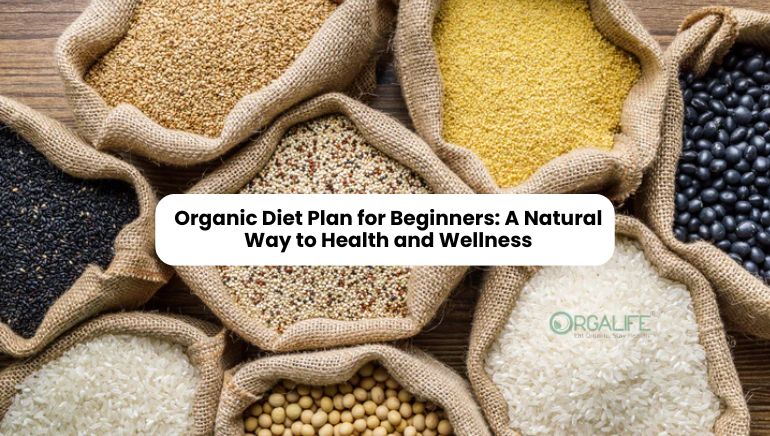Organic Diet Plan for Beginners: A Natural Way to Health and Wellness
In today’s fast-paced world, where processed and chemically grown food has become the norm, switching to an organic diet offers a refreshing and healthier alternative. Whether you're looking to lose weight, boost immunity, or simply eat clean, an organic diet is a great place to start. If you're new to this concept, don't worry—we'll guide you step by step. This beginner-friendly organic diet plan helps you understand what organic food is, why it matters, and how to make the transition smooth and sustainable.

What is an Organic Diet?
An organic diet focuses on consuming food grown without the use of synthetic fertilizers, pesticides, GMOs, or harmful preservatives. This includes fresh fruits, vegetables, grains, dairy, and meats that are produced naturally, often through eco-friendly farming practices.
Choosing organic means you’re choosing food that's better for your health and the environment.
Benefits of Organic FooBefore diving into the meal plan, let’s understand why switching to organic is a smart decision.
1. Free from Harmful Chemicals:
Organic produce is grown without synthetic pesticides and fertilizers, making it a cleaner option for your body.
2. Higher Nutritional Value:
Studies suggest that organic fruits and vegetables may contain more antioxidants and nutrients than their conventional counterparts.
3. Better Taste and Freshness:
Organic food is often fresher, as it’s usually sold closer to the place of production and has no artificial preservatives.
4. Environmentally Friendly:
Organic farming reduces pollution, conserves water, and supports soil health.
5. Safer for Animals:
Organic dairy and meat come from animals that are not given antibiotics or hormones and are raised under humane conditions.
Beginner-Friendly Organic Diet Plan

Here’s a 7-day organic diet plan that’s easy to follow, delicious, and nourishing.
Day 1: Fresh Start
- Breakfast: Organic oats porridge with almond milk, topped with organic banana and flaxseeds.
- Lunch: Brown rice with organic mixed vegetable curry.
- Snack: Organic apple with peanut butter.
- Dinner: Quinoa salad with cucumbers, tomatoes, and olive oil dressing.
Day 2: Plant Power
- Breakfast: Smoothie with organic spinach, banana, and chia seeds.
- Lunch: Whole wheat chapati with organic dal and sautéed green beans.
- Snack: Roasted organic makhana (fox nuts).
- Dinner: Millet khichdi with organic curd and salad.
Day 3: Protein Boost
- Breakfast: Organic eggs with multigrain toast and avocado.
- Lunch: Grilled tofu or paneer with organic brown rice and stir-fried vegetables.
- Snack: A handful of organic almonds and walnuts.
- Dinner: Lentil soup with whole grain bread.
Day 4: Fiber-Rich Meals
- Breakfast: Organic muesli with fruit and yogurt.
- Lunch: Rajma with organic brown rice and cucumber raita.
- Snack: Fresh seasonal fruit (mango, berries, or papaya).
- Dinner: Stuffed organic bell peppers with quinoa and veggies.
Day 5: Gut-Friendly Foods
- Breakfast: Overnight oats with yogurt and chia seeds.
- Lunch: Vegetable poha made with organic flattened rice.
- Snack: Buttermilk or coconut water.
- Dinner: Organic moong dal soup with sautéed spinach.
Day 6: Detox Day
- Breakfast: Warm lemon water followed by a fruit bowl.
- Lunch: Steamed organic vegetables with millet.
- Snack: Herbal tea with roasted seeds.
- Dinner: Light lentil broth with whole grain crackers.
Day 7: Balanced Wrap-Up
- Breakfast: Smoothie bowl with berries, nuts, and seeds.
- Lunch: Chickpea salad with lemon and herbs.
- Snack: Organic fruit smoothie.
- Dinner: Vegetable curry with brown rice or millet roti.
Tips to Transition Smoothly
- Start Small: Begin with replacing one or two items like fruits or milk with organic versions.
- Read Labels: Look for certified organic labels to ensure authenticity.
- Shop Local: Visit local farmers’ markets to find fresh organic produce.
- Plan Meals: Prepare a weekly menu to avoid last-minute unhealthy choices.
- Hydrate Naturally: Drink filtered or spring water and include organic herbal teas.

Why Choose Orgalife for Organic Products?
As you start your journey toward a healthier life, finding the right source of organic products is essential. Orgalife is committed to offering 100% certified organic food items, including grains, oils, spices, and snacks. Their products are not only free from chemicals and additives but also packed with the richness of nature.
Whether you're buying your first pack of organic rice or switching to wood-pressed oils, Orgalife ensures quality, purity, and affordability at every step. It’s not just food—it’s a lifestyle choice.
Conclusion
Adopting an organic diet doesn’t have to be overwhelming. With small, consistent steps, you can experience the amazing benefits of clean eating. Remember, it’s not about being perfect but making better choices every day. So take that first bite toward a healthier, more sustainable future—naturally and organically.

